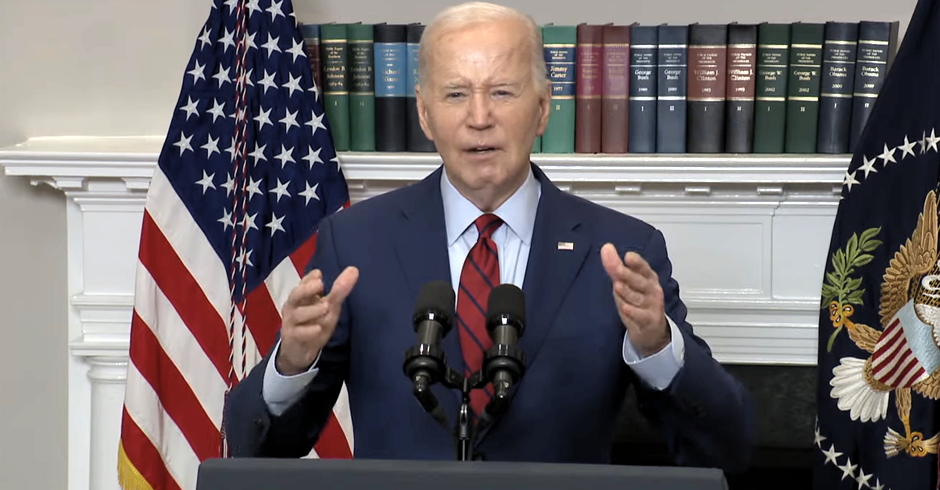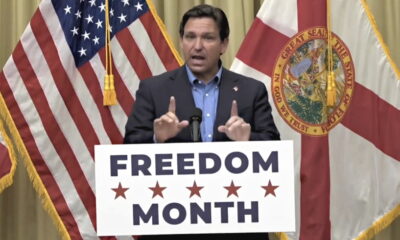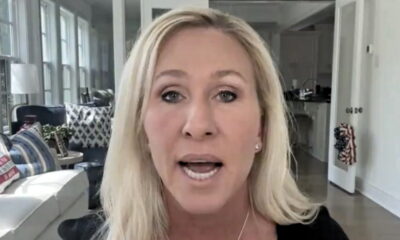Obama Addresses The Nation On Dangers Of Default – Full Video And Text
On Monday night, President Obama addressed the nation on the dangers of default. Here is the full video and a complete transcript.
Â
https://youtube.com/watch?v=O08VHT6TsRM%3Fversion%3D3%26hl%3Den_US
Â
THE PRESIDENT:
Good evening. Tonight, I want to talk about the debate we’ve been having in Washington over the national debt — a debate that directly affects the lives of all Americans.
For the last decade, we’ve spent more money than we take in. In the year 2000, the government had a budget surplus. But instead of using it to pay off our debt, the money was spent on trillions of dollars in new tax cuts, while two wars and an expensive prescription drug program were simply added to our nation’s credit card.
As a result, the deficit was on track to top $1 trillion the year I took office. To make matters worse, the recession meant that there was less money coming in, and it required us to spend even more -– on tax cuts for middle-class families to spur the economy; on unemployment insurance; on aid to states so we could prevent more teachers and firefighters and police officers from being laid off. These emergency steps also added to the deficit.
Now, every family knows that a little credit card debt is manageable. But if we stay on the current path, our growing debt could cost us jobs and do serious damage to the economy. More of our tax dollars will go toward paying off the interest on our loans. Businesses will be less likely to open up shop and hire workers in a country that can’t balance its books. Interest rates could climb for everyone who borrows money -– the homeowner with a mortgage, the student with a college loan, the corner store that wants to expand. And we won’t have enough money to make job-creating investments in things like education and infrastructure, or pay for vital programs like Medicare and Medicaid.
Because neither party is blameless for the decisions that led to this problem, both parties have a responsibility to solve it. And over the last several months, that’s what we’ve been trying to do. I won’t bore you with the details of every plan or proposal, but basically, the debate has centered around two different approaches.
The first approach says, let’s live within our means by making serious, historic cuts in government spending. Let’s cut domestic spending to the lowest level it’s been since Dwight Eisenhower was President. Let’s cut defense spending at the Pentagon by hundreds of billions of dollars. Let’s cut out waste and fraud in health care programs like Medicare — and at the same time, let’s make modest adjustments so that Medicare is still there for future generations. Finally, let’s ask the wealthiest Americans and biggest corporations to give up some of their breaks in the tax code and special deductions.
This balanced approach asks everyone to give a little without requiring anyone to sacrifice too much. It would reduce the deficit by around $4 trillion and put us on a path to pay down our debt. And the cuts wouldn’t happen so abruptly that they’d be a drag on our economy, or prevent us from helping small businesses and middle-class families get back on their feet right now.
This approach is also bipartisan. While many in my own party aren’t happy with the painful cuts it makes, enough will be willing to accept them if the burden is fairly shared. While Republicans might like to see deeper cuts and no revenue at all, there are many in the Senate who have said, “Yes, I’m willing to put politics aside and consider this approach because I care about solving the problem.†And to his credit, this is the kind of approach the Republican Speaker of the House, John Boehner, was working on with me over the last several weeks.
The only reason this balanced approach isn’t on its way to becoming law right now is because a significant number of Republicans in Congress are insisting on a different approach — a cuts-only approach -– an approach that doesn’t ask the wealthiest Americans or biggest corporations to contribute anything at all. And because nothing is asked of those at the top of the income scale, such an approach would close the deficit only with more severe cuts to programs we all care about –- cuts that place a greater burden on working families.
So the debate right now isn’t about whether we need to make tough choices. Democrats and Republicans agree on the amount of deficit reduction we need. The debate is about how it should be done. Most Americans, regardless of political party, don’t understand how we can ask a senior citizen to pay more for her Medicare before we ask a corporate jet owner or the oil companies to give up tax breaks that other companies don’t get. How can we ask a student to pay more for college before we ask hedge fund managers to stop paying taxes at a lower rate than their secretaries? How can we slash funding for education and clean energy before we ask people like me to give up tax breaks we don’t need and didn’t ask for?
That’s not right. It’s not fair. We all want a government that lives within its means, but there are still things we need to pay for as a country -– things like new roads and bridges; weather satellites and food inspection; services to veterans and medical research.
And keep in mind that under a balanced approach, the 98 percent of Americans who make under $250,000 would see no tax increases at all. None. In fact, I want to extend the payroll tax cut for working families. What we’re talking about under a balanced approach is asking Americans whose incomes have gone up the most over the last decade -– millionaires and billionaires -– to share in the sacrifice everyone else has to make. And I think these patriotic Americans are willing to pitch in. In fact, over the last few decades, they’ve pitched in every time we passed a bipartisan deal to reduce the deficit. The first time a deal was passed, a predecessor of mine made the case for a balanced approach by saying this:
“Would you rather reduce deficits and interest rates by raising revenue from those who are not now paying their fair share, or would you rather accept larger budget deficits, higher interest rates, and higher unemployment? And I think I know your answer.â€
Those words were spoken by Ronald Reagan. But today, many Republicans in the House refuse to consider this kind of balanced approach -– an approach that was pursued not only by President Reagan, but by the first President Bush, by President Clinton, by myself, and by many Democrats and Republicans in the United States Senate. So we’re left with a stalemate.
Now, what makes today’s stalemate so dangerous is that it has been tied to something known as the debt ceiling -– a term that most people outside of Washington have probably never heard of before.
Understand –- raising the debt ceiling does not allow Congress to spend more money. It simply gives our country the ability to pay the bills that Congress has already racked up. In the past, raising the debt ceiling was routine. Since the 1950s, Congress has always passed it, and every President has signed it. President Reagan did it 18 times. George W. Bush did it seven times. And we have to do it by next Tuesday, August 2nd, or else we won’t be able to pay all of our bills.
Unfortunately, for the past several weeks, Republican House members have essentially said that the only way they’ll vote to prevent America’s first-ever default is if the rest of us agree to their deep, spending cuts-only approach.
If that happens, and we default, we would not have enough money to pay all of our bills -– bills that include monthly Social Security checks, veterans’ benefits, and the government contracts we’ve signed with thousands of businesses.
For the first time in history, our country’s AAA credit rating would be downgraded, leaving investors around the world to wonder whether the United States is still a good bet. Interest rates would skyrocket on credit cards, on mortgages and on car loans, which amounts to a huge tax hike on the American people. We would risk sparking a deep economic crisis -– this one caused almost entirely by Washington.
So defaulting on our obligations is a reckless and irresponsible outcome to this debate. And Republican leaders say that they agree we must avoid default. But the new approach that Speaker Boehner unveiled today, which would temporarily extend the debt ceiling in exchange for spending cuts, would force us to once again face the threat of default just six months from now. In other words, it doesn’t solve the problem.
First of all, a six-month extension of the debt ceiling might not be enough to avoid a credit downgrade and the higher interest rates that all Americans would have to pay as a result. We know what we have to do to reduce our deficits; there’s no point in putting the economy at risk by kicking the can further down the road.
But there’s an even greater danger to this approach. Based on what we’ve seen these past few weeks, we know what to expect six months from now. The House of Representatives will once again refuse to prevent default unless the rest of us accept their cuts-only approach. Again, they will refuse to ask the wealthiest Americans to give up their tax cuts or deductions. Again, they will demand harsh cuts to programs like Medicare. And once again, the economy will be held captive unless they get their way.
This is no way to run the greatest country on Earth. It’s a dangerous game that we’ve never played before, and we can’t afford to play it now. Not when the jobs and livelihoods of so many families are at stake. We can’t allow the American people to become collateral damage to Washington’s political warfare.
Congress now has one week left to act, and there are still paths forward. The Senate has introduced a plan to avoid default, which makes a down payment on deficit reduction and ensures that we don’t have to go through this again in six months.
I think that’s a much better approach, although serious deficit reduction would still require us to tackle the tough challenges of entitlement and tax reform. Either way, I’ve told leaders of both parties that they must come up with a fair compromise in the next few days that can pass both houses of Congress -– and a compromise that I can sign. I’m confident we can reach this compromise. Despite our disagreements, Republican leaders and I have found common ground before. And I believe that enough members of both parties will ultimately put politics aside and help us make progress.
Now, I realize that a lot of the new members of Congress and I don’t see eye-to-eye on many issues. But we were each elected by some of the same Americans for some of the same reasons. Yes, many want government to start living within its means. And many are fed up with a system in which the deck seems stacked against middle-class Americans in favor of the wealthiest few. But do you know what people are fed up with most of all?
They’re fed up with a town where compromise has become a dirty word. They work all day long, many of them scraping by, just to put food on the table. And when these Americans come home at night, bone-tired, and turn on the news, all they see is the same partisan three-ring circus here in Washington. They see leaders who can’t seem to come together and do what it takes to make life just a little bit better for ordinary Americans. They’re offended by that. And they should be.
The American people may have voted for divided government, but they didn’t vote for a dysfunctional government. So I’m asking you all to make your voice heard. If you want a balanced approach to reducing the deficit, let your member of Congress know. If you believe we can solve this problem through compromise, send that message.
America, after all, has always been a grand experiment in compromise. As a democracy made up of every race and religion, where every belief and point of view is welcomed, we have put to the test time and again the proposition at the heart of our founding: that out of many, we are one. We’ve engaged in fierce and passionate debates about the issues of the day, but from slavery to war, from civil liberties to questions of economic justice, we have tried to live by the words that Jefferson once wrote: “Every man cannot have his way in all things — without this mutual disposition, we are disjointed individuals, but not a society.â€
History is scattered with the stories of those who held fast to rigid ideologies and refused to listen to those who disagreed. But those are not the Americans we remember. We remember the Americans who put country above self, and set personal grievances aside for the greater good. We remember the Americans who held this country together during its most difficult hours; who put aside pride and party to form a more perfect union.
That’s who we remember. That’s who we need to be right now. The entire world is watching. So let’s seize this moment to show why the United States of America is still the greatest nation on Earth –- not just because we can still keep our word and meet our obligations, but because we can still come together as one nation.
Thank you, God bless you, and may God bless the United States of America.

Enjoy this piece?
… then let us make a small request. The New Civil Rights Movement depends on readers like you to meet our ongoing expenses and continue producing quality progressive journalism. Three Silicon Valley giants consume 70 percent of all online advertising dollars, so we need your help to continue doing what we do.
NCRM is independent. You won’t find mainstream media bias here. From unflinching coverage of religious extremism, to spotlighting efforts to roll back our rights, NCRM continues to speak truth to power. America needs independent voices like NCRM to be sure no one is forgotten.
Every reader contribution, whatever the amount, makes a tremendous difference. Help ensure NCRM remains independent long into the future. Support progressive journalism with a one-time contribution to NCRM, or click here to become a subscriber. Thank you. Click here to donate by check.
 |






















